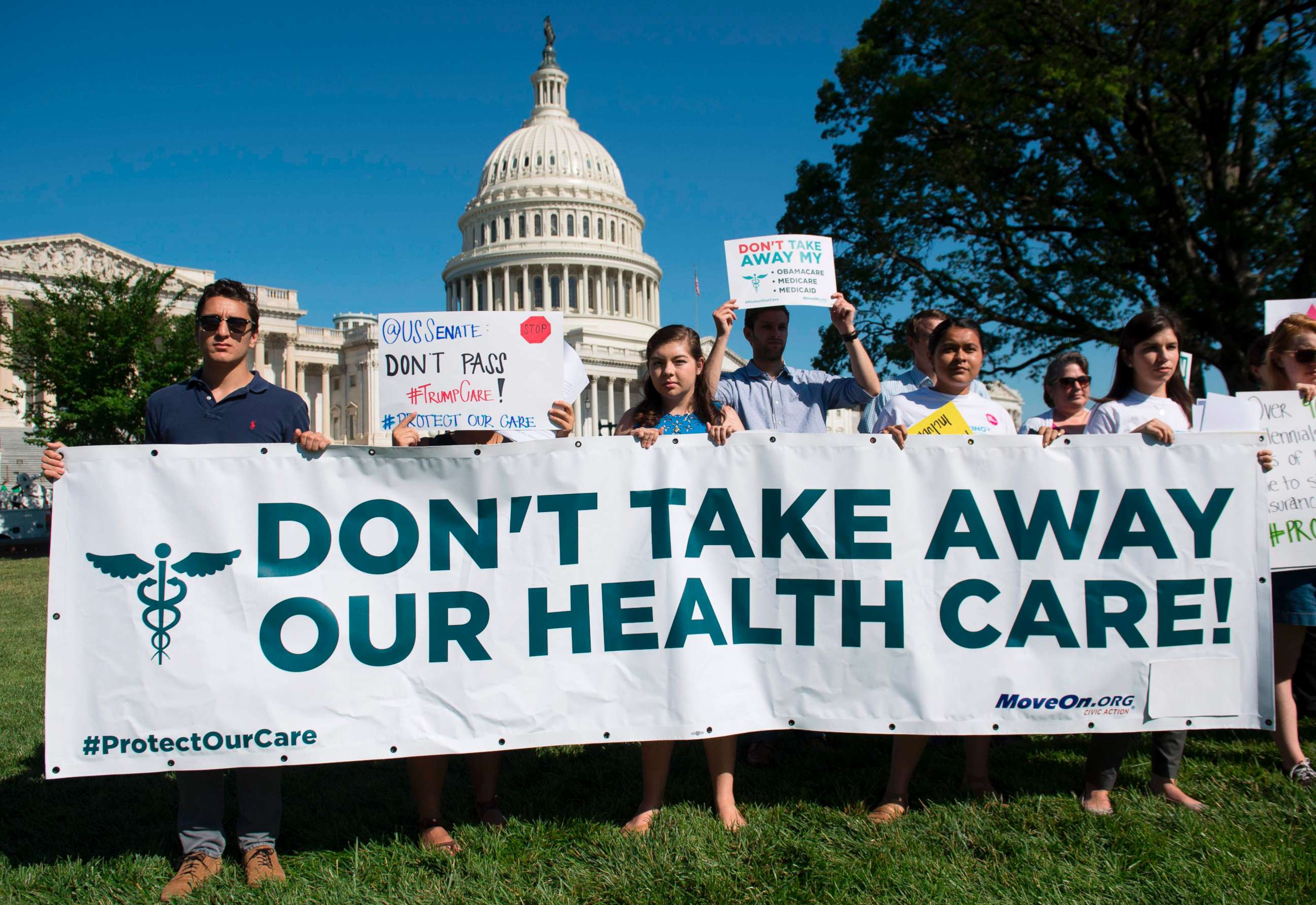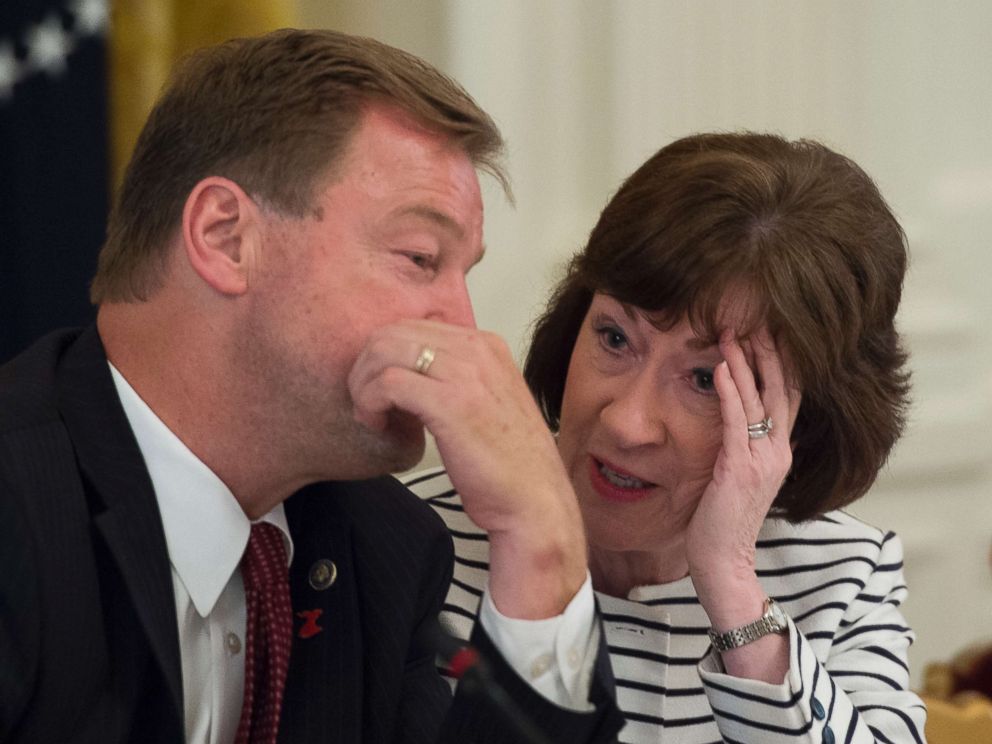Where the Senate GOP health care opponents stand
A procedural vote was delayed because of lack of support.
— -- A growing number of Republicans are speaking out against the now-delayed Senate health care bill.
The bill already had more than enough opponents to stop a procedural vote from happening. But more Republican senators have publicly sided against the bill after Senate Majority Leader Mitch McConnell postponed a vote until after the Fourth of July recess. Nine senators are opposed to it (up from five) and two more have expressed serious concerns. Twenty-four senators said they are still reviewing the bill while 17 said they are either in favor of the bill or leaning that way. The Democrats in the Senate are united against the bill.
Here’s a breakdown of senators who oppose the bill.
1. Sen. Shelley Moore Capito, R-W.Va., cited her state's role as having the "largest Medicaid population in the country" as a source of her concerns.
"Throughout this debate, I have said that I will only support a bill that provides access to affordable health care coverage for West Virginians, including those on Medicaid and those struggling with drug addiction," Capito wrote in a statement released Wednesday.
"I recognize that many West Virginians rely on health coverage and access to substance abuse treatment because of my state’s decision to expand coverage through Medicaid. I have studied the draft legislation and CBO analysis to understand its impact on West Virginians. As drafted, this bill will not ensure access to affordable health care in West Virginia, does not do enough to combat the opioid epidemic that is devastating my state, cuts traditional Medicaid too deeply, and harms rural health care providers," she said.
2. Sen. Rand Paul, R-Ky., said the bill doesn’t offer a sufficiently conservative alternative to Obamacare.
Paul was one of four senators, along with Ted Cruz, Mike Lee and Ron Johnson, who issued a statement shortly after the initial Senate bill was released, saying they could not support it in its current form.
“Currently, for a variety of reasons, we are not ready to vote for this bill, but we are open to negotiation and obtaining more information before it is brought to the floor,” they said in a June 22 statement.
Paul, for his part, has said he can’t get behind what he calls Obamacare’s “bailout of the insurance companies” through various programs designed to help insurers keep older and sicker people on their rolls. While the Senate bill would eventually get rid of the ACA’s cost-sharing payments to insurers, it would include a fund to help stabilize insurance markets as the new law takes shape.
Paul sent President Donald Trump and Senate Majority Leader Mitch McConnell, R-Nev., a list of four specific areas where the bill can be improved, including association health plans, insurance company bailouts, tax credits to help people pay for coverage and the continuous coverage requirement, which would impose a six-month waiting period for people who were trying to sign up for coverage after not having it for more than two months.
Paul suggested Wednesday that Senate leaders should consider breaking off what he considers the more moderate provisions into a separate piece of legislation that could get some Democratic support, and then bring the more conservative pieces of Obamacare replacement to the floor in a separate bill.
“I’ll vote for a more narrowly structured repeal bill – and the big government items the moderates want, they can still get ‘em,” he said.
3. Sen. Rob Portman, R-Ohio, said the bill as written would be too harmful to his state, which expanded Medicaid coverage under Obamacare and which he said needs more opioid addiction funding.
"The Senate draft before us includes some promising changes to reduce premiums in the individual insurance market, but I continue to have real concerns about the Medicaid policies in this bill, especially those that impact drug treatment at a time when Ohio is facing an opioid epidemic," he wrote in the statement released Wednesday.
“For months, I have engaged with my colleagues on solutions that I believe are necessary to ensure that we improve our health care system and better combat this opioid epidemic. Unfortunately, the Senate draft falls short and therefore I cannot support it in its current form,” he continued.

4. Sen. Ted Cruz, R-Texas, wants individuals to be able to buy insurance plans that don’t offer essential health benefits.
Cruz has an amendment that would allow insurance companies to offer plans that don’t include the ACA-mandated essential health benefits, like maternity and mental health care, as long as they offer one plan in each area that meets those mandates.
“It expands options for consumers, it expands the freedom of consumers to purchase more affordable plans,” he told reporters Wednesday, explaining his proposal.
Cruz was also one of the first senators — along with Paul, Lee and Johnson — to announce his opposition to the bill.
5. Sen. Susan Collins, R-Maine, who was initially skeptical of the bill, said she was fundamentally opposed to it after the Congressional Budget Office released its analysis.
"For my part, I'm very concerned about the cost of insurance for older people with serious chronic illnesses, and the impact of the Medicaid cuts on our state governments, the most vulnerable people in our society, and health care providers such as our rural hospitals and nursing home, most of whom are very dependent on the Medicaid program,” she said Sunday on “This Week.”
"It makes absolutely no sense to eliminate federal funding for Planned Parenthood," she added. "There already are long-standing restrictions on the use of federal funds for abortion. So that's not what this debate is about. And Planned Parenthood is an important provider of health care services, including family planning and cancer screenings for millions of Americans, particularly women."
After the vote was postponed Tuesday, the day after the CBO report was released, Collins told reporters her objections are fundamental: “It’s difficult for me to see how any tinkering is going to satisfy my fundamental and deep concerns about the impact of the bill.”
6. Sen. Jerry Moran, R-Kan., argued that the current bill does not fully repeal Obamacare.
“The Senate health care bill missed the mark for Kansans and therefore did not have my support," he said in a statement Tuesday after McConnell pulled the bill . He said he is "committed" to finding "a path forward that truly repeals and replaces Obamacare."

7. Sen. Dean Heller, R-Nev., came out against the bill last week and suffered repercussions after a Trump-supporting superPAC released ads against him in his home state.
"First, it doesn't protect Nevadans on Medicaid. Second, the cuts to Medicaid threatens critical services in Nevada, services that a lot of Nevadans depend on," he said in a news conference on June 23.
Heller's office confirmed that he raised the issue of the attack ads released by America First Policies during the meeting between President Donald Trump and Republican senators at the White House on Tuesday. Hours later, the group announced that it had pulled the ad after it learned Heller "decided to come back to the table to negotiate with his colleagues on the Senate bill."
8. Sen. Mike Lee, R-Utah, has been one of the bill’s earliest holdouts, joining with Sens. Cruz, Paul, and Johnson to oppose the bill.
Then on Wednesday, Lee released a statement saying the bill "included hundreds of billions of dollars in tax cuts for the affluent, bailouts for insurance companies, and subsidies for lower-income Americans. But it ignored the middle-class families who have borne the brunt of Obamacare, and who have been left behind by both parties in Washington for too long. That’s why I opposed it. And it’s why I’m happy we postponed the vote today."
9. Sen. Ron Johnson, R-Wis., appeared to walk back his opposition to the bill.
During an interview with CNN’s “New Day” Wednesday morning, Johnson denied that he was opposed to the bill and would vote against it.
“I've never said I oppose the bill and will vote no,” he said, directly contradicting the statement he made with his three Senate colleagues Wednesday.




